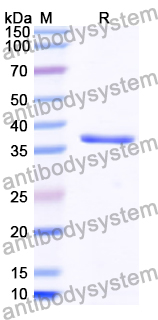Catalog No.
YHA54801
Expression system
E. coli
Species
Homo sapiens (Human)
Protein length
His129-Cys205
Predicted molecular weight
37.28 kDa
Nature
Recombinant
Endotoxin level
Please contact with the lab for this information.
Purity
>90% as determined by SDS-PAGE.
Accession
O15499
Applications
ELISA, Immunogen, SDS-PAGE, WB, Bioactivity testing in progress
Form
Lyophilized
Storage buffer
Lyophilized from a solution in PBS pH 7.4, 0.02% NLS, 1mM EDTA, 4% Trehalose, 1% Mannitol.
Reconstitution
Reconstitute in sterile water for a stock solution. A copy of datasheet will be provided with the products, please refer to it for details.
Shipping
In general, proteins are provided as lyophilized powder/frozen liquid. They are shipped out with dry ice/blue ice unless customers require otherwise.
Stability and Storage
Use a manual defrost freezer and avoid repeated freeze thaw cycles. Store at 2 to 8°C for frequent use. Store at -20 to -80°C for twelve months from the date of receipt.
Alternative Names
Homeobox protein goosecoid-2, GSC-2, Homeobox protein goosecoid-like, GSC-L, GSC2, GSCL
The MAPK homolog, Smk1, promotes assembly of the glucan layer of the spore wall in S. cerevisiae., PMID:38874213
Genetically defined nucleus incertus neurons differ in connectivity and function., PMID:38819436
ROS-independent toxicity of Fe3O4 nanoparticles to yeast cells: Involvement of mitochondrial dysfunction., PMID:29572073
Lead sulfide nanoparticles increase cell wall chitin content and induce apoptosis in Saccharomyces cerevisiae., PMID:24704549
Arsenic stress elicits cytosolic Ca(2+) bursts and Crz1 activation in Saccharomyces cerevisiae., PMID:22745270
Ste11p MEKK signals through HOG, mating, calcineurin and PKC pathways to regulate the FKS2 gene., PMID:22114773
New Fks hot spot for acquired echinocandin resistance in Saccharomyces cerevisiae and its contribution to intrinsic resistance of Scedosporium species., PMID:21576441
Mpk1 MAPK association with the Paf1 complex blocks Sen1-mediated premature transcription termination., PMID:21376235
Loss of Goosecoid-like and DiGeorge syndrome critical region 14 in interpeduncular nucleus results in altered regulation of rapid eye movement sleep., PMID:20921407
Transcriptional reporters for genes activated by cell wall stress through a non-catalytic mechanism involving Mpk1 and SBF., PMID:20641022
Yeast Mpk1 cell wall integrity mitogen-activated protein kinase regulates nucleocytoplasmic shuttling of the Swi6 transcriptional regulator., PMID:20219973
Multiple functional domains of the yeast l,3-beta-glucan synthase subunit Fks1p revealed by quantitative phenotypic analysis of temperature-sensitive mutants., PMID:20124029
Mechanism of Mpk1 mitogen-activated protein kinase binding to the Swi4 transcription factor and its regulation by a novel caffeine-induced phosphorylation., PMID:19805511
Yeast Mpk1 mitogen-activated protein kinase activates transcription through Swi4/Swi6 by a noncatalytic mechanism that requires upstream signal., PMID:18268013
Snc1p v-SNARE transport to the prospore membrane during yeast sporulation is dependent on endosomal retrieval pathways., PMID:17645731
Homologous subunits of 1,3-beta-glucan synthase are important for spore wall assembly in Saccharomyces cerevisiae., PMID:17158736
Signaling alkaline pH stress in the yeast Saccharomyces cerevisiae through the Wsc1 cell surface sensor and the Slt2 MAPK pathway., PMID:17088254
The Smk1p MAP kinase negatively regulates Gsc2p, a 1,3-beta-glucan synthase, during spore wall morphogenesis in Saccharomyces cerevisiae., PMID:16116083
Saccharomyces cerevisiae Sps1p regulates trafficking of enzymes required for spore wall synthesis., PMID:15755916
Analysis of beta-1,3-glucan assembly in Saccharomyces cerevisiae using a synthetic interaction network and altered sensitivity to caspofungin., PMID:15166135
Three regulatory regions of the Aedes aegypti glutamine synthetase gene differentially regulate expression: identification of a crucial regulator in the first exon., PMID:14986918
Functional analysis of the cysteine residues and the repetitive sequence of Saccharomyces cerevisiae Pir4/Cis3: the repetitive sequence is needed for binding to the cell wall beta-1,3-glucan., PMID:12898712
Pneumocystis carinii BCK1 functions in a mitogen-activated protein kinase cascade regulating fungal cell-wall assembly., PMID:12885408
Combination of caspofungin with inhibitors of the calcineurin pathway attenuates growth in vitro in Aspergillus species., PMID:12562696
A single FKS homologue in Yarrowia lipolytica is essential for viability., PMID:12210896
Differential sensitivity between Fks1p and Fks2p against a novel beta -1,3-glucan synthase inhibitor, aerothricin3 [corrected]., PMID:12202487
Mutations in Fks1p affect the cell wall content of beta-1,3- and beta-1,6-glucan in Saccharomyces cerevisiae., PMID:12185837
Unilateral angiofibromas. An oligosymptomatic and segmentary form of tuberous sclerosis., PMID:11989480
Cell wall perturbation in yeast results in dual phosphorylation of the Slt2/Mpk1 MAP kinase and in an Slt2-mediated increase in FKS2-lacZ expression, glucanase resistance and thermotolerance., PMID:10974100
The MAPKKK Ste11 regulates vegetative growth through a kinase cascade of shared signaling components., PMID:10535982
The contribution of the O-glycosylated protein Pir2p/Hsp150 to the construction of the yeast cell wall in wild-type cells and beta 1,6-glucan-deficient mutants., PMID:10209754
The prechordal midline of the chondrocranium is defective in Goosecoid-1 mouse mutants., PMID:9533949
Loss of the plasma membrane-bound protein Gas1p in Saccharomyces cerevisiae results in the release of beta1,3-glucan into the medium and induces a compensation mechanism to ensure cell wall integrity., PMID:9515908
Tcn1p/Crz1p, a calcineurin-dependent transcription factor that differentially regulates gene expression in Saccharomyces cerevisiae., PMID:9407036
Calcineurin acts through the CRZ1/TCN1-encoded transcription factor to regulate gene expression in yeast., PMID:9407035
Temperature-induced expression of yeast FKS2 is under the dual control of protein kinase C and calcineurin., PMID:9447998
cps1+, a Schizosaccharomyces pombe gene homolog of Saccharomyces cerevisiae FKS genes whose mutation confers hypersensitivity to cyclosporin A and papulacandin B., PMID:9401022
Cloning of the Candida albicans homolog of Saccharomyces cerevisiae GSC1/FKS1 and its involvement in beta-1,3-glucan synthesis., PMID:9209021
Segregating expression domains of two goosecoid genes during the transition from gastrulation to neurulation in chick embryos., PMID:9108361
Multiple copies of PBS2, MHP1 or LRE1 produce glucanase resistance and other cell wall effects in Saccharomyces cerevisiae., PMID:9090049
A region of mouse chromosome 16 is syntenic to the DiGeorge, velocardiofacial syndrome minimal critical region., PMID:9037598
Isolation of a gene involved in 1,3-beta-glucan synthesis in Aspergillus nidulans and purification of the corresponding protein., PMID:8755864
Differential expression and function of two homologous subunits of yeast 1,3-beta-D-glucan synthase., PMID:7565718
Characterization and gene cloning of 1,3-beta-D-glucan synthase from Saccharomyces cerevisiae., PMID:7649185


